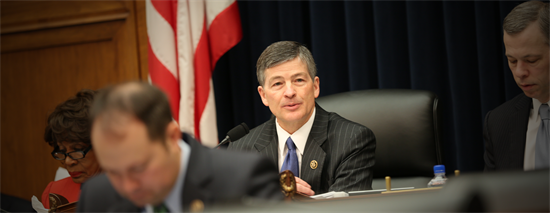|
WASHINGTON- Financial Services Committee Chairman Jeb Hensarling (R-TX) delivered the following opening statement at today’s full committee hearing to receive the Monetary Policy and State of the Economy report from Federal Reserve Chair Janet Yellen:
Last month we all heard President Obama attempt to take an economic victory lap in his State of the Union speech. The American people are having none of it, though. They are tired of hearing from the out of touch ruling-class in Washington about just how good things are when their realities are vastly different. So Chair Yellen, notwithstanding the fact that you are a presidential appointee, I hope you don’t follow suit this morning.
The reality is since the president was elected and the Fed embarked upon its unprecedented quantitative easing and zero real interest rate policies, working families’ paychecks have declined, their net wealth has declined and the real unemployment rate continues to hover around 10 percent. Approximately one in six is on food stamps and almost 15 percent live in poverty. There hasn’t been a single year when economic growth has reached three percent.
As one published report on this failure noted, “there is no parallel for this since the end of World War II, maybe not since the beginning of the Republic.” Last quarter’s less than one percent GDP growth just punctuates the matter for struggling, working families.
Now I will not use this hearing to either praise or condemn the Fed’s decision to raise rates by 25 basis points interest rates in December. Nor do I think it appropriate to advise the FOMC on how to vote during its next meeting. But given that Article One, Section Eight of the Constitution gives Congress the power to coin money and regulate the value thereof, I do feel compelled to demand that the Fed adopt a monetary policy course that is predictable, transparent and sustainable and – barring terribly exigent circumstances – to stick with it. That is part of the rationale underlying the House-passed Fed Oversight Reform and Modernization Act – the FORM Act.
To use Austrian economist Friedrich Hayek’s phrase, it is “fatal conceit” to believe that the Fed is capable of micromanaging our economy to some state of economic nirvana. We now have at least eight years of recent history to prove otherwise. Most importantly, no amount of monetary policy can substitute for sound fiscal policy. Unless and until the crushing regulatory onslaught of Obamacare, Dodd-Frank and the EPA is replaced with greater opportunity, competition and innovation, the Fed cannot substantially help out economy; it can only hurt it.
It can hurt it by continuing to serve as the financier and facilitator of our unsustainable federal debt. Just last month, the Congressional Budget Office yet again warned of our unsustainable debt in its latest baseline release, which references the debt 199 times.
The Fed can hurt the economy by continuing to force investors to chase yield, thus inflating dangerous asset bubbles – the deflating of which we are likely seeing in our turbulent equity markets today.
The Fed can continue to hurt our economy by failing to unwind its unprecedented balance sheet. By growing it almost 500 percent, the Fed itself has become one of our largest sources of systemic risk.
Finally, separate and apart from monetary policy, alarmingly the Fed – under Dodd-Frank – can now functionally control virtually every major corner of the financial services sector of our economy. It does so with almost no accountability or transparency.
Not only does this harm economic growth, it is an affront to due process, checks and balances, and the rule of law. The American people should again be duly alarmed that they may wake up one day to discover that our central bankers have become our central planners.
|


